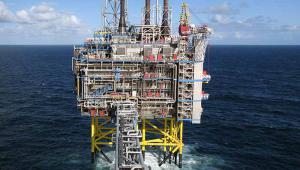However, the deficit remained at over four times the equivalent figure for the UK as a whole, reflecting lower tax revenues and higher public spending per head north of the border.
According to the annual Government Expenditure and Revenue Scotland report, Scotland spent £13.4bn more than it raised in taxes in 2017-18, up marginally from the £13.3bn deficit recorded last year.
But total revenue reached £60bn for the first time, with the oil and gas sector accounting for £1.3bn, up from £266m last year.
The figures come a week after the economy in Scotland was shown to have grown faster in the first quarter of the year than across the UK as a whole.
First minister Nicola Sturgeon said the figures showed that Scotland was “on the right trajectory”.
"It also demonstrates that our commitment to sustainable economic growth is the right one and we will continue to stimulate our economy in this way to reduce the deficit,” she said.
“With the limited economic powers currently at our disposal, the actions we are taking to promote sustainable economic development are helping to ensure that the key economic indicators are moving in the right direction.”
Finance secretary Derek Mackay said the expansion in overall revenue, combined with exports growth, confirmed that Scotland had a “productive and growing economy”.
"The latest economic data points to an improving picture in Scotland,” he said.
“Our economy grew twice as fast as the UK in the most recent quarter, while unemployment remains close to its record low and confidence is returning to the oil and gas sector.”
However, Scottish secretary David Mundell said the gap between Scotland’s deficit as a share of GDP and that of the UK was “concerning”, and that the figures confirmed the benefits of Scotland remaining within the UK.
“Simply put, Scotland contributed 8% of UK tax, and received more than 9% of UK spending for the benefit of families across the country,” he said.
Analysts struck a warning note over revisions to income tax and VAT which, they said, had led to a weakening of Scotland’s fiscal position since last year.
The Fraser of Allander Institute think-tank said it was the relative growth in receipts per person in Scotland compared to the UK that would determine the size of the Scottish budget.
“There had been expectation from some that if there were revisions to either historical estimates or forecasts, these would generally be in the same direction and therefore have no net effect on the budget,” it said.
“However, it can be seen today that for both these taxes, the revisions to the UK are in the opposite direction, which means the effect on the Scottish budget of the estimates and forecasts of these taxes in future years could be large and hard to predict.”
Economist John McLaren said the decline in Scotland’s share of UK tax revenue from 8.1% in 2013-14 to 7.8% in 2017-18 was a cause for concern.
“While this year’s GERS shows a welcome improvement in Scotland’s fiscal balance, it also shows some worrying new findings, including a declining share of UK revenues,” he said. “If this persists, then the recent improvement in the deficit may grind to a halt.”
The Fraser of Allander Institute also warned that the figures were based on the current constitutional arrangements, and so gave little indication of the economic implications of Scottish independence.
“If the very purpose of independence is to take different choices about the type of economy and society that we live in, then a set of accounts based upon the current constitutional settlement and policy priorities will tell us little about the long-term finances of an independent Scotland,” it said.
However, the figures did provide a starting point for any discussion of alternative fiscal arrangements, it said.
David Phillips, associate director of the Institute for Fiscal Studies, attributed the dip in income tax and VAT revenues to the relatively small number of high earners north of the border and the slow economic growth seen in Scotland in recent years.
“This year’s figures continue to paint a relatively weak fiscal picture that is likely to persist unless there is a strong rebound in oil revenues or a substantial increase in Scottish economic growth,” he said.
The Scottish Government is currently consulting on the content of a new potential publication on the devolved public finances of Scotland, which would be published alongside the existing yearly GERS report.











